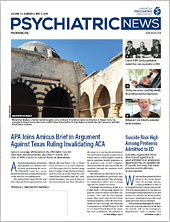A training program funded by a grant from the Substance Abuse and Mental Health Services Administration (SAMHSA) to the American Academy of Addiction Psychiatry seeks to increase the number of underrepresented and minority health care professionals in addiction psychiatry and to train existing addiction specialists in the care of minority patients with substance use disorders.
REACH (Recognizing and Eliminating disparities in Addiction through Culturally informed Healthcare) is a five-year initiative enrolling scholars for the first year, beginning in July and running until June 30, 2020. REACH provides instruction, research support, and mentorship and kicks off with a one-week, intensive training at Yale University from July 7 to 13.
Ayana Jordan, M.D., Ph.D., medical director of REACH and an assistant professor of psychiatry at Yale, said the program is seeking to fill 17 slots, seven of which will be allotted to senior residents and other physicians who are scheduled to begin an addiction fellowship in the 2019-2020 academic year. The remaining 10 slots will be allotted to medical students, advanced practice registered nurses (APRNs), nurse practitioner students, physician assistant students, and medical residents of all specialties.
“REACH is an innovative program that will increase the number of addiction providers from underrepresented backgrounds, while also teaching the existing workforce about structural competence and ways to improve outcomes for people with substance use disorders,” Jordan said.
Jordan is APA’s early career psychiatrist trustee-at-large. Jeanette Tetrault, M.D., program director of the addiction medicine fellowship at Yale, is co-medical director of REACH.
All applications must be accompanied by a letter from a program director. Interested students and trainees, especially those interested in pursuing an addiction fellowship beginning July 1, are encouraged to apply as soon as possible; rolling enrollment is under way.
The program will fund travel to and from the training, and a stipend will be provided; the amount of the stipend will depend on the trainee’s level.
The one-week course at Yale will teach participants about key structures that create and perpetuate health disparities in addiction and co-occurring mental disorders and about best practices related to evidenced-based, culturally informed care of minority patients with substance use disorders.
REACH will provide mentorship to scholars appropriate to their level of training about how to pursue a career in addiction, focusing on patients with substance use disorders in underrepresented communities. Participants will be encouraged to engage in ongoing scholarly endeavors related to providing care in underserved communities.
Jordan announced the program last month at the annual meeting of the Black Psychiatrists of America at National Harbor in Oxen Hill, Md. (Coverage of the BPA meeting will appear in future issues of Psychiatric News.) ■
More information about REACH, including an application, can be accessed
here. Questions and requests for further information should be sent to
[email protected].

